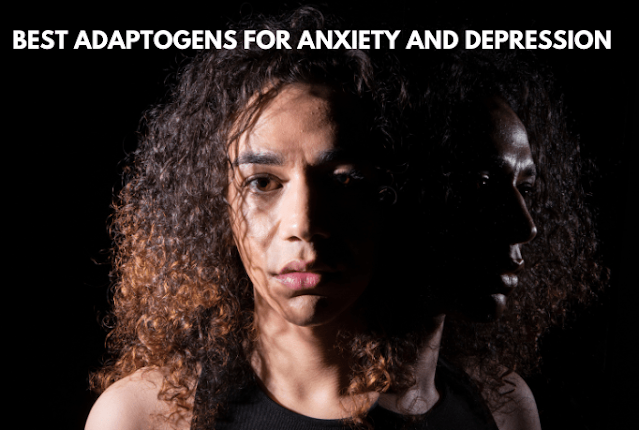Harnessing Nature's Calm | Exploring the Best Adaptogens for Anxiety and Depression
Introduction
In today's fast-paced world, the prevalence of anxiety and depression has become a pressing concern for many. While conventional treatments exist, there's a growing interest in natural remedies, particularly adaptogens. Adaptogens are a class of herbs and mushrooms that assist the body in adapting to stressors, promoting balance and resilience. In this article, we delve into the world of adaptogens, exploring the best ones for managing anxiety and depression.
Understanding Adaptogens
Before diving into specific adaptogens, it's essential to understand their mechanism of action. Adaptogens work by modulating the body's stress response system, specifically the hypothalamic-pituitary-adrenal (HPA) axis. This helps regulate the production of stress hormones like cortisol, thereby reducing the impact of stress on the body and mind. By promoting homeostasis, adaptogens contribute to overall well-being and mental health.
Best Adaptogens for Anxiety and Depression
Ashwagandha (Withania somnifera)
Ashwagandha, also known as Indian ginseng, is one of the most well-known adaptogens for anxiety and depression. It has been used for centuries in Ayurvedic medicine for its calming properties. Research suggests that ashwagandha can reduce cortisol levels, alleviate symptoms of anxiety, and improve mood. It also enhances resilience to stress, making it an excellent choice for those dealing with chronic stressors.
Rhodiola Rosea
Rhodiola rosea, native to the mountainous regions of Europe and Asia, is another powerful adaptogen known for its stress-relieving properties. Studies have shown that rhodiola supplementation can reduce symptoms of depression and improve overall mood. It works by enhancing the activity of neurotransmitters like serotonin and dopamine, which play key roles in regulating mood and emotions.
Holy Basil (Ocimum sanctum)
Holy basil, also known as tulsi, is revered in Ayurvedic medicine for its adaptogenic and medicinal properties. It contains compounds that help the body cope with stress and promote mental clarity. Holy basil has been shown to reduce anxiety levels and improve symptoms of depression by regulating cortisol production and supporting the nervous system.
Reishi Mushroom (Ganoderma lucidum)
Reishi mushroom is a staple in traditional Chinese medicine renowned for its adaptogenic and immune-boosting properties. It contains bioactive compounds called triterpenes, which have been linked to reduced anxiety and depression symptoms. Reishi helps modulate the HPA axis, leading to a more balanced stress response and improved mood.
Siberian Ginseng (Eleutherococcus senticosus)
Siberian ginseng, also known as eleuthero, is an adaptogen native to Russia and parts of Asia. It has been used for centuries to combat fatigue, enhance vitality, and reduce stress. Studies suggest that Siberian ginseng can improve mental performance, reduce anxiety levels, and enhance overall well-being, making it a valuable ally in managing anxiety and depression.
Conclusion
In conclusion, adaptogens offer a natural and effective way to manage anxiety and depression by promoting resilience to stress and supporting overall mental health. Ashwagandha, rhodiola rosea, holy basil, reishi mushroom, and Siberian ginseng are among the best adaptogens for anxiety and depression, each offering unique benefits backed by scientific research. Incorporating these adaptogens into your daily routine, whether through supplements or herbal preparations, can help you navigate life's challenges with greater ease and tranquility. Embrace the power of nature's calm and discover the transformative potential of adaptogens for your mental well-being.
Frequently Asked Questions And Answers About the "best adaptogens for anxiety and depression"
What adaptogens increase serotonin?
Adaptogens such as Rhodiola Rosea and Ashwagandha have been studied for their potential to increase serotonin levels in the brain. While they may not directly increase serotonin production, they work by modulating the body's stress response system, which can indirectly affect serotonin levels. Rhodiola Rosea, in particular, has been shown to enhance the activity of neurotransmitters like serotonin, contributing to improved mood and emotional well-being.
Do adaptogens work for anxiety?
Yes, adaptogens have shown promise in helping to alleviate symptoms of anxiety. Adaptogens work by regulating the body's stress response system, which plays a significant role in anxiety. By modulating stress hormone levels, such as cortisol, adaptogens help the body adapt to stressors more effectively, reducing the impact of anxiety. Ashwagandha, Rhodiola Rosea, and Holy Basil are among the adaptogens commonly used for anxiety relief.
What is the most powerful adaptogen?
Determining the most powerful adaptogen can be subjective and may vary depending on individual needs and preferences. However, some adaptogens are highly regarded for their broad range of benefits and extensive research support. Ashwagandha is often considered one of the most powerful adaptogens due to its ability to combat stress, improve mood, enhance cognitive function, and support overall well-being. Its adaptogenic properties have been extensively studied and validated by scientific research.
Is rhodiola or ashwagandha better for depression?
Both Rhodiola Rosea and Ashwagandha have shown promise in managing symptoms of depression, but their effectiveness may vary depending on individual response and the underlying cause of depression. Rhodiola Rosea is known for its ability to enhance mood and increase energy levels by modulating neurotransmitter activity. Ashwagandha, on the other hand, has been shown to reduce stress and anxiety, which are often linked to depressive symptoms. Ultimately, the choice between Rhodiola Rosea and Ashwagandha for depression may depend on factors such as personal preference, tolerance, and specific symptoms experienced.






No comments:
Post a Comment
Please Don't Spam Comments Please Don't Use Any URL And Spam Comments